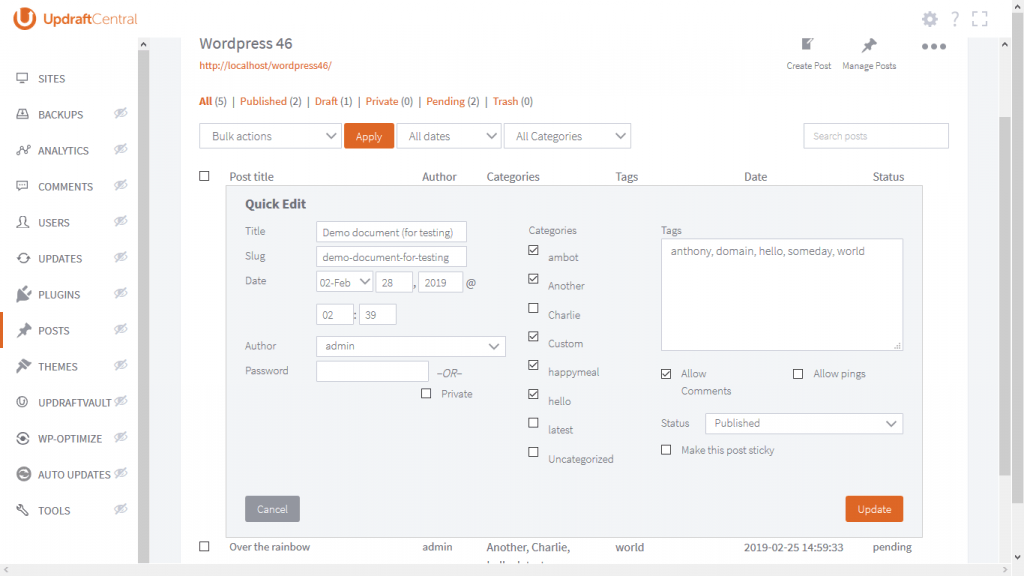You can now manage all of your posts, from all of your sites, from a single location in Updraft Central’s dashboard posts feature.
By going to the “Posts” tab in your Updraft Central dashboard, you can now edit all of your posts, without having to go to each individual site.
Post and Page Modules feature details:
- Edit page details and post content, such as article’s title, body, permalinks, etc. As you normally do within the WordPress panel, but with some limitations (see limitations section below)
- Add/remove categories or create a new ones
- Create or assign new categories and tags to your post
- Upload featured image or change existing images to your content
- Change publishing details
- Change post owner/author
- Preview changes
- Set parent pages and templates for your page content.
- Edit your pages and posts content either using the classic editor or block editor (previously known as Gutenberg).
- Quickly manage your pages and posts information through the quick edit feature.
- Choose/edit publishing dates.
- Schedule your posts or pages.
- Password protect your content.
- Easily set your content status or make it private while you are still editing.
- Easily move around posts and pages by setting their status to a different state.
- Pages and posts search is supported with date and category filters.
- Bulk actions for pages and posts are supported.
- Easily switch editing between the classic or block editor. Just close the editor and switch to the other editor when required.
- Edited remote content and its details/properties are automatically reflected among the quick edit, classic and block editors. No re-loading needed.
Limitations:
- Currently, both editors (classic and block) do not support custom metaboxes.
- Block editing is only supported when WordPress version 5.0 and higher is installed on the remote sites.
- For block editing, custom blocks that were installed on the remote sites must also be installed on the WordPress install where UpdraftCentral is installed/hosted if you wish to use them.
- Revisions viewing and auto-saving are currently disabled as not to interfere with editing/handling of remote page and post contents.
While the new post module feature currently only works on your UpdraftCentral dashboard WordPress install, we aim to have it also support remote blocks in your block editor in the near future. There is currently a workaround that you can employ in the meantime. To use this workaround, just make sure that your UpdraftCentral dashboard WordPress install is in sync with your controlled sites that are registered with UpdraftCentral.
Block Editor
If you wish to use a specific or custom block that you have created or installed on your controlled site/sites, then you must first copy or install them to your UpdraftCentral dashboard WordPress install also.
Classic Editor
The post module does not currently support any third party options. Editing is limited to the following options/sections “Publish”, “Categories”, “Tags” and “Featured Image” only.
Both Classic and Block Editors
Currently the post module does not support viewing or browsing of revisions of the current post and moving of the current post to trash directly from the editor. If you want to move the current post to trash or delete it, then it is recommended to do it outside the editor via the “Post” table interface in which the list of remote posts are displayed.
Summary
The new UpdraftCentral Post module gives an extra level of control to users that have multiple sites with lots of posts. The convenience and time saving aspects of this new release further improve the overall features and usability of UpdraftCentral, making it a must have for anyone looking to update their posts with minimal fuss.
The post Post and page module added to UpdraftCentral appeared first on UpdraftPlus. UpdraftPlus – Backup, restore and migration plugin for WordPress.

